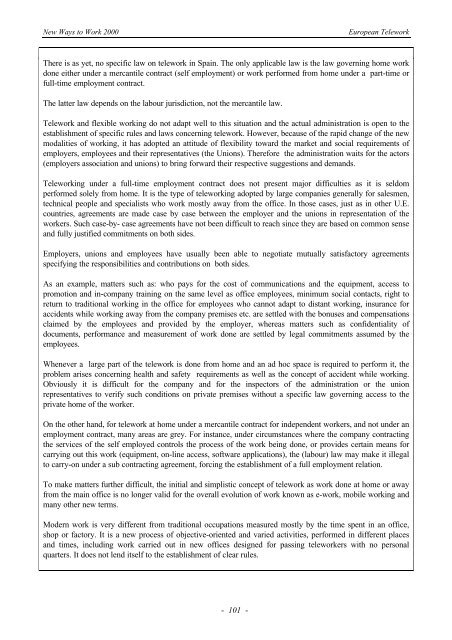eWORK 2000 - European Telework Week
eWORK 2000 - European Telework Week
eWORK 2000 - European Telework Week
- No tags were found...
You also want an ePaper? Increase the reach of your titles
YUMPU automatically turns print PDFs into web optimized ePapers that Google loves.
New Ways to Work <strong>2000</strong><strong>European</strong> <strong>Telework</strong>There is as yet, no specific law on telework in Spain. The only applicable law is the law governing home workdone either under a mercantile contract (self employment) or work performed from home under a part-time orfull-time employment contract.The latter law depends on the labour jurisdiction, not the mercantile law.<strong>Telework</strong> and flexible working do not adapt well to this situation and the actual administration is open to theestablishment of specific rules and laws concerning telework. However, because of the rapid change of the newmodalities of working, it has adopted an attitude of flexibility toward the market and social requirements ofemployers, employees and their representatives (the Unions). Therefore the administration waits for the actors(employers association and unions) to bring forward their respective suggestions and demands.<strong>Telework</strong>ing under a full-time employment contract does not present major difficulties as it is seldomperformed solely from home. It is the type of teleworking adopted by large companies generally for salesmen,technical people and specialists who work mostly away from the office. In those cases, just as in other U.E.countries, agreements are made case by case between the employer and the unions in representation of theworkers. Such case-by- case agreements have not been difficult to reach since they are based on common senseand fully justified commitments on both sides.Employers, unions and employees have usually been able to negotiate mutually satisfactory agreementsspecifying the responsibilities and contributions on both sides.As an example, matters such as: who pays for the cost of communications and the equipment, access topromotion and in-company training on the same level as office employees, minimum social contacts, right toreturn to traditional working in the office for employees who cannot adapt to distant working, insurance foraccidents while working away from the company premises etc. are settled with the bonuses and compensationsclaimed by the employees and provided by the employer, whereas matters such as confidentiality ofdocuments, performance and measurement of work done are settled by legal commitments assumed by theemployees.Whenever a large part of the telework is done from home and an ad hoc space is required to perform it, theproblem arises concerning health and safety requirements as well as the concept of accident while working.Obviously it is difficult for the company and for the inspectors of the administration or the unionrepresentatives to verify such conditions on private premises without a specific law governing access to theprivate home of the worker.On the other hand, for telework at home under a mercantile contract for independent workers, and not under anemployment contract, many areas are grey. For instance, under circumstances where the company contractingthe services of the self employed controls the process of the work being done, or provides certain means forcarrying out this work (equipment, on-line access, software applications), the (labour) law may make it illegalto carry-on under a sub contracting agreement, forcing the establishment of a full employment relation.To make matters further difficult, the initial and simplistic concept of telework as work done at home or awayfrom the main office is no longer valid for the overall evolution of work known as e-work, mobile working andmany other new terms.Modern work is very different from traditional occupations measured mostly by the time spent in an office,shop or factory. It is a new process of objective-oriented and varied activities, performed in different placesand times, including work carried out in new offices designed for passing teleworkers with no personalquarters. It does not lend itself to the establishment of clear rules.- 101 -








